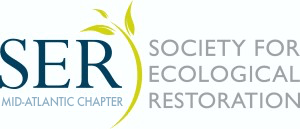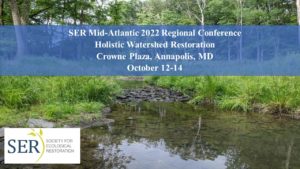
Plenary Session 1 – Native Plants and Seed Use
Moderator: Fran Chismar, Sultan of Sales, Pinelands Nursery; Fran@pinelandsnursery.com
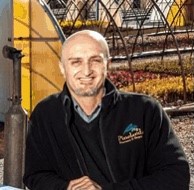 Meet Fran Chismar. Fran likes to talk – and with over 30 years of nursery industry experience, Fran has a lot to talk about. He insists he is not an expert on anything, but knows just enough about everything to be dangerous. Fran brings his experience with music podcasting, and joins it with his industry knowledge in restoration and native plants, to help guide you through Native Plants, Healthy Planet. Fran is currently the Sultan of Sales at Pinelands Nursery in Columbus, NJ.
Meet Fran Chismar. Fran likes to talk – and with over 30 years of nursery industry experience, Fran has a lot to talk about. He insists he is not an expert on anything, but knows just enough about everything to be dangerous. Fran brings his experience with music podcasting, and joins it with his industry knowledge in restoration and native plants, to help guide you through Native Plants, Healthy Planet. Fran is currently the Sultan of Sales at Pinelands Nursery in Columbus, NJ.
Presentation 1: A Survey of Native Plant and Seed Use East of the Mississippi River
Presenter: Sara Tangren, National Capital PRISM Department of Energy & Environment Government of the District of Columbia; sara.tangren@dc.gov
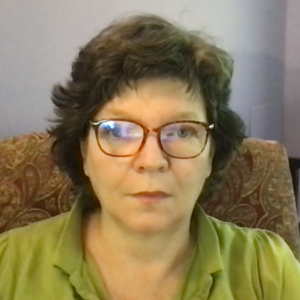 Sara is a practitioner, researcher, and educator who has worked with the flora of the Mid-Atlantic region for more than 30 years. As such, she remembers the days when she thought Japanese honeysuckle was our worst invasive plant and that our native mosquitoes, then simply referred to as mosquitoes, were annoying. She has worked as an environmental consultant, a native plant and seed producer, an extension agent, and a professional invasive plant slayer. She recently published an article about the commercial shortages of native plants and seeds in the Eastern United States. She is currently Coordinator for the National Capital PRISM. She received her Ph.D. in Natural Resources from the University of Maryland.
Sara is a practitioner, researcher, and educator who has worked with the flora of the Mid-Atlantic region for more than 30 years. As such, she remembers the days when she thought Japanese honeysuckle was our worst invasive plant and that our native mosquitoes, then simply referred to as mosquitoes, were annoying. She has worked as an environmental consultant, a native plant and seed producer, an extension agent, and a professional invasive plant slayer. She recently published an article about the commercial shortages of native plants and seeds in the Eastern United States. She is currently Coordinator for the National Capital PRISM. She received her Ph.D. in Natural Resources from the University of Maryland.
Presentation 2: The Current State of the Native Plant Material Supply Chain in the Mid Atlantic and What Can Be Done to Significantly Improve It?
Presenter: Edward Toth, Mid Atlantic Regional Seed Bank (MARSB); etoth@marsb.org
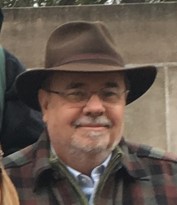 Edward Toth’s career with NYC Parks spanned 36 years, from 1985 to 2021. He was the founding director of the Greenbelt Native Plant Center, the nation’s oldest and largest municipally-owned native plant nursery in the U.S. In 2012 he initiated the Mid-Atlantic Regional Seed Bank (MARSB) program at the GNPC as a regional partner of the national Seeds of Success program. In 2018 he was recipient of the Alfred P. Sloan Public Service Award from the Fund for the City of New York. He is currently a member of the Committee on an Assessment of Native Seed Needs and Capacities of the National Academy of Sciences, Engineering and Medicine. In 2022 MARSB has incorporated as an independent not-for-profit and continues its mission to advocate for and lead the effort to conserve the wild seed resources of the mid-Atlantic while working to improve the supply chain of native plant materials across the region.
Edward Toth’s career with NYC Parks spanned 36 years, from 1985 to 2021. He was the founding director of the Greenbelt Native Plant Center, the nation’s oldest and largest municipally-owned native plant nursery in the U.S. In 2012 he initiated the Mid-Atlantic Regional Seed Bank (MARSB) program at the GNPC as a regional partner of the national Seeds of Success program. In 2018 he was recipient of the Alfred P. Sloan Public Service Award from the Fund for the City of New York. He is currently a member of the Committee on an Assessment of Native Seed Needs and Capacities of the National Academy of Sciences, Engineering and Medicine. In 2022 MARSB has incorporated as an independent not-for-profit and continues its mission to advocate for and lead the effort to conserve the wild seed resources of the mid-Atlantic while working to improve the supply chain of native plant materials across the region.
Plenary Session 2 – Stormwater Management and Stream Restoration
Moderator: Rich Pfingsten, Sr. Restoration Ecologist: richpfingsten@gmail.com
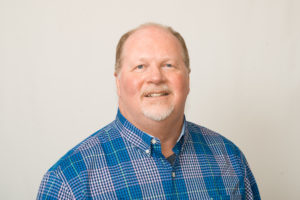
Rich is a Principal and Sr. Restoration Ecologist in Baltimore, MD office with over 38 years of experience. He received his BS degree from Frostburg University in Wildlife and Fisheries in 1984, then began his career with the Maryland Department of Agriculture’s Forest Pest Management section. He began focusing his education and expertise in the scientific field of ecosystem assessment and restoration in the consulting industry in 1989, providing technical and managerial expertise to both public and private sector clients. He has managed a broad variety of ecosystem restoration projects within the Mid-Atlantic, Northeast/New England, and Midwest throughout his career including: nontidal and tidal wetland restoration/mitigation; stream and river restoration; fish passage and dam removal design; bioengineering streambank stabilization; coastal restoration and living shorelines; forest conservation and reforestation; aquatic and terrestrial habitat restoration; rare, threatened, and endangered species protection/restoration; and designing native ecosystem restoration planting/seeding plans that promote pollinator species and other wildlife habitat benefits. Rich’s outside interests include traveling (especially to National Parks), bird/wildlife and nature watching/photography, sports memorabilia, and actively participating in professional and civic organizations.
Presentation 1: Restoring Habitat in the Jackson River Through Addressing Temperature, Water Quality, and Buffers Along the Main Stem.
Presenter: Dani Wise Johnson, Blueline Environmental; dani@bluelineenv.com
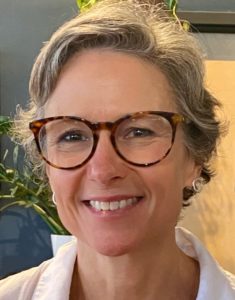 Dani is a hydrologist focusing on river restoration and improving aquatic ecosystems across the US. She has experienced the worlds of ecological restoration, research, master planning, and policy development through her work in academia, the private sector, and with a non-profit organization. Dani has spent much of her career educating other professionals, corporations, and regulatory agencies on hydrological processes and ways to improve and protect water resources. Dani holds a Bachelors in Environmental Science from the College of William and Mary, a Masters degree in Watershed Hydrology from NC State University, and has pursued on-going educational opportunities throughout her career, including, most recently, Environmental Water Transactions course at Oregon State University – supporting her work with water users in the Pacific Northwest, managing severe drought and developing a water marketing program. While Dani has lived and worked in various US locations, she currently resides in Richmond, Virginia and appreciates the proximity to her home river, the mighty James.
Dani is a hydrologist focusing on river restoration and improving aquatic ecosystems across the US. She has experienced the worlds of ecological restoration, research, master planning, and policy development through her work in academia, the private sector, and with a non-profit organization. Dani has spent much of her career educating other professionals, corporations, and regulatory agencies on hydrological processes and ways to improve and protect water resources. Dani holds a Bachelors in Environmental Science from the College of William and Mary, a Masters degree in Watershed Hydrology from NC State University, and has pursued on-going educational opportunities throughout her career, including, most recently, Environmental Water Transactions course at Oregon State University – supporting her work with water users in the Pacific Northwest, managing severe drought and developing a water marketing program. While Dani has lived and worked in various US locations, she currently resides in Richmond, Virginia and appreciates the proximity to her home river, the mighty James.
Presentation 2: Optimizing Bedload Using Two-Dimensional Sediment Transport Modeling for Split Flow Condition in Stream Restoration Designs: A Case Study on the Gwynns Falls Tributary at Kingsbury +
Presenter: Brian Tetrick, WSP; Michael Coco, WSP; Brian.Tetrick@wsp.com, Michael.Coco@wsp.com
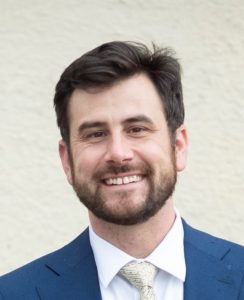 Brian Tetrick, is a Water Resources Engineer with WSP USA Water & Environment located in Baltimore, Maryland. Brian is a Lead Designer and Project Manager in the area of ecological and stream restoration, river and bridge hydraulics and scour and stormwater management. Brian has 16 years of experience designing and managing water resources projects in support of non-point pollution nutrient management, environmental stewardship and aquatic organism habitat and migration.
Brian Tetrick, is a Water Resources Engineer with WSP USA Water & Environment located in Baltimore, Maryland. Brian is a Lead Designer and Project Manager in the area of ecological and stream restoration, river and bridge hydraulics and scour and stormwater management. Brian has 16 years of experience designing and managing water resources projects in support of non-point pollution nutrient management, environmental stewardship and aquatic organism habitat and migration.
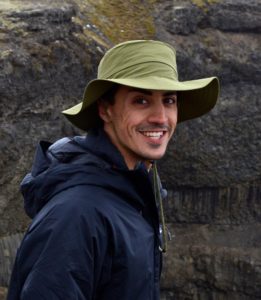 Michael Coco is a Water Resources Engineer with WSP USA located in Baltimore, Maryland. He has 11 years of experience in stream and river restoration, 1D/2D hydraulic modeling, bridge hydraulics and scour analysis, floodplain mapping, and construction phase services. He graduated from Lehigh University with a bachelor’s degree in Civil Engineering.
Michael Coco is a Water Resources Engineer with WSP USA located in Baltimore, Maryland. He has 11 years of experience in stream and river restoration, 1D/2D hydraulic modeling, bridge hydraulics and scour analysis, floodplain mapping, and construction phase services. He graduated from Lehigh University with a bachelor’s degree in Civil Engineering.
Presentation 3: How Do You Determine Achievable Ecological Uplift in Stream Restoration? Biological Monitoring Pre- and Post- Stream Restoration
Presenter: Bree Stephens, RES; Casey Albert, RES; bstephens@res.us, calbert@res.us
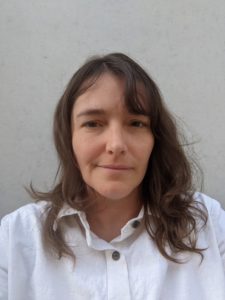 Bree Stephens has over 10 years of stream restoration design and fisheries biology experience. She received a BS in Environmental Science from the University of North Carolina at Asheville, then went on to get her MS in Environmental Studies at the Virginia Commonwealth University, focusing on fisheries biology. While with RES, she has led the design and field work for a number of stream restoration projects where she incorporated her knowledge of aquatic biology into her designs. She has brought in her fisheries biology experience to build a biological monitoring program for RES’s stream restoration projects within the Mid-Atlantic, hoping to build understanding of the impacts of stream restoration to aquatic biology and how to best design for the creatures that live in our streams.
Bree Stephens has over 10 years of stream restoration design and fisheries biology experience. She received a BS in Environmental Science from the University of North Carolina at Asheville, then went on to get her MS in Environmental Studies at the Virginia Commonwealth University, focusing on fisheries biology. While with RES, she has led the design and field work for a number of stream restoration projects where she incorporated her knowledge of aquatic biology into her designs. She has brought in her fisheries biology experience to build a biological monitoring program for RES’s stream restoration projects within the Mid-Atlantic, hoping to build understanding of the impacts of stream restoration to aquatic biology and how to best design for the creatures that live in our streams.
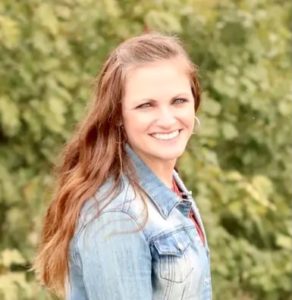 Casey Albert is a Stream Designer for RES for the last 3 years. Her focus is on site evaluations and assessments prior to restoration as well as post-restoration monitoring tasks, including benthic macroinvertebrate sampling in Virginia and Maryland.
Casey Albert is a Stream Designer for RES for the last 3 years. Her focus is on site evaluations and assessments prior to restoration as well as post-restoration monitoring tasks, including benthic macroinvertebrate sampling in Virginia and Maryland.
Presentation 4: Channel Restoration in an Urban Environment: Meshing of Hard Engineered Structures with Stream Restoration to Restore Channel Function
Presenter: Natalia Almodovar-Rosario, WSP; Natalia.Almodovar@wsp.com
 Natalia Almodóvar is a Lead Water Resources Engineer with WSP in Baltimore, MD. She has 10 years of experience in Water Resources Engineering, focusing on surface water. Natalia specializes in the areas of planning, design and construction oversight of stream restoration projects. She received a Master Degree in Environmental and Water Resources from the University of Puerto Rico.
Natalia Almodóvar is a Lead Water Resources Engineer with WSP in Baltimore, MD. She has 10 years of experience in Water Resources Engineering, focusing on surface water. Natalia specializes in the areas of planning, design and construction oversight of stream restoration projects. She received a Master Degree in Environmental and Water Resources from the University of Puerto Rico.
Presentation 5:The Preserve at Eisenhower Golf Course Stream Restoration
Presenter: Rich Pfingsten, Sr. Restoration Ecologist (bio above as moderator)
Plenary Session 3 – Wetland Restoration
Moderator: Terry Doss, Director – NJSEA’s Meadowlands Research & Restoration Institute; TDoss@njsea.com
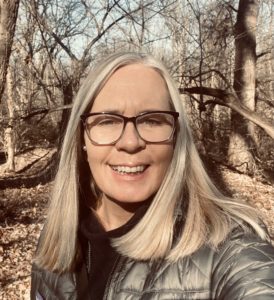 Terry Doss, CERP, is a restoration ecologist who serves as Co-Director and Chief Restoration Scientist for the Meadowlands Research & Restoration Institute, NJ Sports & Exposition Authority. Over the past 35 years, Terry has served as a local leader in restoring the natural areas located within the urban wildlands of NY and NJ, with a primary expertise in managing coastal and wetland restoration projects to reduce flood risks while improving resiliency for coastal communities. Terry received a BS in Agricultural Sciences in 1984, and later received a Master of Marine Policy in 1989, both from the University of Delaware. In 2003, Terry studied Earth Sciences as part of a PhD program at Lehigh University where her research focus was the fens of Alberta, Canada – studying soil carbon accumulation within peat cores taken across Western Canada. Since joining NJSEA, Terry’s primary focus has been on assisting the Authority with meeting their stated mandate to protect the delicate balance of nature. Working closely with MRRI staff, she developed a Strategic Plan for the Natural Resources Group, a USEPA-approved Wetland Program Plan, and the NJSEA’s first Wildlife Action Plan. These documents now provide a living framework for the research and restoration goals undertaken daily by MRRI staff. Terry regularly works in the field with MRRI staff to monitor site conditions, assist with Diamondback Terrapin and avian surveys; build and restore nests and breeding areas; and manage invasive species that threaten the biodiversity of the Meadowlands.
Terry Doss, CERP, is a restoration ecologist who serves as Co-Director and Chief Restoration Scientist for the Meadowlands Research & Restoration Institute, NJ Sports & Exposition Authority. Over the past 35 years, Terry has served as a local leader in restoring the natural areas located within the urban wildlands of NY and NJ, with a primary expertise in managing coastal and wetland restoration projects to reduce flood risks while improving resiliency for coastal communities. Terry received a BS in Agricultural Sciences in 1984, and later received a Master of Marine Policy in 1989, both from the University of Delaware. In 2003, Terry studied Earth Sciences as part of a PhD program at Lehigh University where her research focus was the fens of Alberta, Canada – studying soil carbon accumulation within peat cores taken across Western Canada. Since joining NJSEA, Terry’s primary focus has been on assisting the Authority with meeting their stated mandate to protect the delicate balance of nature. Working closely with MRRI staff, she developed a Strategic Plan for the Natural Resources Group, a USEPA-approved Wetland Program Plan, and the NJSEA’s first Wildlife Action Plan. These documents now provide a living framework for the research and restoration goals undertaken daily by MRRI staff. Terry regularly works in the field with MRRI staff to monitor site conditions, assist with Diamondback Terrapin and avian surveys; build and restore nests and breeding areas; and manage invasive species that threaten the biodiversity of the Meadowlands.
Presentation 1: Creation of a Giant Floodplain/Wetland Habitat Complex on the Teaneck Creek
Presenter: Bill Young, SumCo Eco Contracting; byoung@sumcoeco.com
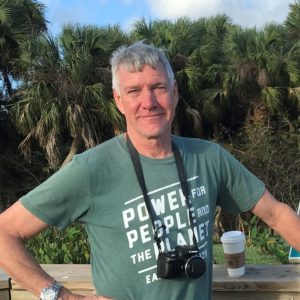 Bill holds a BS degree from SUNY Forestry in Landscape Architecture. He was licensed to practice Landscape Architecture in NY and FL. Bill has a Masters degree from Pratt Institute in Urban Design. Bill has been Adjunct Professor in Ecology at City College of NY (2 years), Temple University (1 year) and University of Pennsylvania, School of Design (16 years). He specializes in restoration of highly disturbed sites-landfills, Superfunds, Brownfields, mines and contaminated sites. Bill was a pioneer in establishing native plant communities on capped landfills (Fresh Kills, Fountain Avenue and Pennsylvania Avenue Landfills). He has built or monitored over 700 acres of wetlands in the Metro NYC area as well as built over 5,000 linear feet of streams and rivers, deploying bioengineering and fluvial systems to restore natural stream characteristics. He has taught Rutgers Short Courses on Stream Restoration and Fluvial Systems.
Bill holds a BS degree from SUNY Forestry in Landscape Architecture. He was licensed to practice Landscape Architecture in NY and FL. Bill has a Masters degree from Pratt Institute in Urban Design. Bill has been Adjunct Professor in Ecology at City College of NY (2 years), Temple University (1 year) and University of Pennsylvania, School of Design (16 years). He specializes in restoration of highly disturbed sites-landfills, Superfunds, Brownfields, mines and contaminated sites. Bill was a pioneer in establishing native plant communities on capped landfills (Fresh Kills, Fountain Avenue and Pennsylvania Avenue Landfills). He has built or monitored over 700 acres of wetlands in the Metro NYC area as well as built over 5,000 linear feet of streams and rivers, deploying bioengineering and fluvial systems to restore natural stream characteristics. He has taught Rutgers Short Courses on Stream Restoration and Fluvial Systems.
Presentation 2: First Wetland Mitigation Bank in New York City – Restoring Urban Wetlands and Measuring Their Success
Presenter: Robert F. Wachter III, WSP; Robert.Wachter@wsp.com
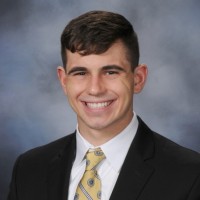 Robert (Robbie) is an assistant consultant, water resources engineer with two years of experience in engineering consulting, with an emphasis on water resources engineering and ecological restoration. His experience includes developing engineering plans and specifications; providing construction supervision; conducting post-construction monitoring and maintenance for restoration projects; and developing state flood hazard permits. He has worked on over 430 acres of coastal wetland restoration and 2 miles of stream restoration. Mr. Wachter has a B.S. in Environmental Engineering with a minor in Resiliency and Sustainability of Engineering Systems Minor from the University of Notre Dame and a B.S. in Environmental Science from King’s College, PA.
Robert (Robbie) is an assistant consultant, water resources engineer with two years of experience in engineering consulting, with an emphasis on water resources engineering and ecological restoration. His experience includes developing engineering plans and specifications; providing construction supervision; conducting post-construction monitoring and maintenance for restoration projects; and developing state flood hazard permits. He has worked on over 430 acres of coastal wetland restoration and 2 miles of stream restoration. Mr. Wachter has a B.S. in Environmental Engineering with a minor in Resiliency and Sustainability of Engineering Systems Minor from the University of Notre Dame and a B.S. in Environmental Science from King’s College, PA.
Presentation 3: Living or Nature-Based Shorelines in Sandusky Bay, Ohio: Designs for Water Quality and Habitat Improvements
Presenter: Joe Berg, Biohabitats; jberg@biohabitats.com
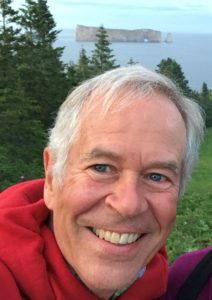
Joe is an ecosystems ecologist with a focus on restoration of a variety of aquatic habitats, including tidal and non-tidal costal habitats, integrated stream, wetland and floodplains, all with a focus on restoring functions and values to deliver ecosystem services to society, increase natural capital, and integrate local community needs with an appreciation of natural resource values. He is the Practice Leader for Ecological Restoration for Biohabitats.
Presentation 4: 20 Years of Community-Focused Restoration in the Lititz Run Watershed
Presenter: Ward Oberholtzer, LandStudies, Inc.; Ward@landstudies.com
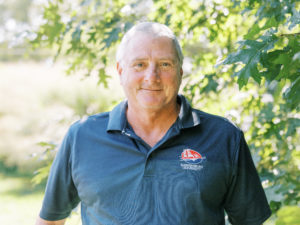 Ward Oberholtzer is a Professional Engineer working for LandStudies, Inc. His 35 years of expertise includes applied stream morphology, hydrology/hydraulics, bridge scour, fluvial geomorphology, river mechanics and sediment transport investigations. He provides competent supervision and technical engineering support for all aspects of stream and floodplain restoration, watershed assessments, and wetland creation and enhancements. Additionally, he has been a consultant to Maryland State Highway Administration’s (MDSHA) Office of Bridge Development and the Structural Hydrologic and Hydraulics Unit. Mr. Oberholtzer is a graduate of the University of Maryland with a degree in Agricultural Engineering and a concentration in Soil and Water Engineering.
Ward Oberholtzer is a Professional Engineer working for LandStudies, Inc. His 35 years of expertise includes applied stream morphology, hydrology/hydraulics, bridge scour, fluvial geomorphology, river mechanics and sediment transport investigations. He provides competent supervision and technical engineering support for all aspects of stream and floodplain restoration, watershed assessments, and wetland creation and enhancements. Additionally, he has been a consultant to Maryland State Highway Administration’s (MDSHA) Office of Bridge Development and the Structural Hydrologic and Hydraulics Unit. Mr. Oberholtzer is a graduate of the University of Maryland with a degree in Agricultural Engineering and a concentration in Soil and Water Engineering.
Presentation 5: Developing a Wetlands Management Framework for New York City Through Ecological Assessment
Presenter: Rebecca K. Swadek, NYC Department of Parks and Recreation; Rebecca.Swadek@parks.nyc.gov
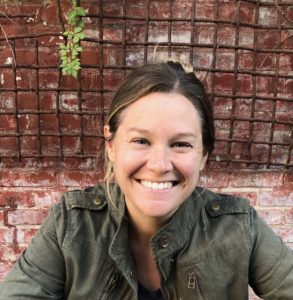 Rebecca Swadek is the Director of Wetlands Management at NYC Parks where she oversees an interdisciplinary team focused on protecting and managing the streams, rivers, lakes, and wetlands on NYC’s parkland. She has worked for NYC Parks for nearly 10 years and has over 13 years of experience ranging from plant taxonomy to ecological restoration, green roofs, and land management in Texas, California, and New York. She holds a master’s degree in environmental science from Texas Christian University and a bachelor’s degree in biology from Texas A&M University.
Rebecca Swadek is the Director of Wetlands Management at NYC Parks where she oversees an interdisciplinary team focused on protecting and managing the streams, rivers, lakes, and wetlands on NYC’s parkland. She has worked for NYC Parks for nearly 10 years and has over 13 years of experience ranging from plant taxonomy to ecological restoration, green roofs, and land management in Texas, California, and New York. She holds a master’s degree in environmental science from Texas Christian University and a bachelor’s degree in biology from Texas A&M University.
Plenary Session 4 – Invasive Species Management
Moderator: John Phelps, Senior Business Development Consultant/Environmental Scientist – Solitude Lake Management
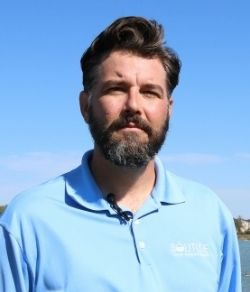
Presentation 1: When to Scout: Integrating Community Science, Invasion Phase, and Volunteer Effort to Leverage Spatial Data Collection for Adaptive Management of Invasive Species
Presenter: Lea Johnson, Longwood Gardens; ljohnson@longwoodgardens.org
 Lea Johnson is Associate Director, Land Stewardship and Ecology, in Longwood Gardens’ Division of Research and Conservation. In this role she directs a multidisciplinary team to advance science-based land stewardship in a variety of temperate habitat types including forests, meadows, wetlands, and agricultural lands. Dr. Johnson is an ecologist who joins basic research in plant ecology with applications to land management and design. She collaborates across disciplines to understand the ecology of environments changed by people, and to advance science underpinning successful interventions to improve ecosystem health and functions in an urbanizing world. She is interested in processes that unfold over time, at multiple spatial and temporal scales. She is also an adjunct faculty member with the University of Maryland Department of Plant Science and Landscape Architecture, and an affiliate faculty member in the Plant Science Graduate Program.
Lea Johnson is Associate Director, Land Stewardship and Ecology, in Longwood Gardens’ Division of Research and Conservation. In this role she directs a multidisciplinary team to advance science-based land stewardship in a variety of temperate habitat types including forests, meadows, wetlands, and agricultural lands. Dr. Johnson is an ecologist who joins basic research in plant ecology with applications to land management and design. She collaborates across disciplines to understand the ecology of environments changed by people, and to advance science underpinning successful interventions to improve ecosystem health and functions in an urbanizing world. She is interested in processes that unfold over time, at multiple spatial and temporal scales. She is also an adjunct faculty member with the University of Maryland Department of Plant Science and Landscape Architecture, and an affiliate faculty member in the Plant Science Graduate Program.
Presentation 2: Two-Horned Trapa: An Emerging Invader Threatens the Chesapeake Bay
Presenter: Sara Tangren (bio and contact above) (National Capital PRISM), Patricia Greenberg (Fairfax County Parks), and Ian Pfingsten (USGS); Patricia.Greenberg@fairfaxcounty.gov
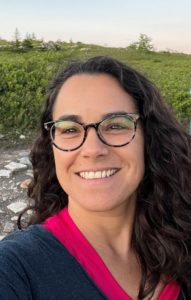 Patricia Pearl Greenberg is an Ecologist with the Fairfax County Park Authority in northern Virginia. She holds master’s degree in environmental science and policy with a focus on urban forestry. Her interest in invasive species sparked during her undergraduate work in environmental studies at Eckerd College in Florida. Patricia’s experience in Peace Corps, Panama increased her passion for sustainable, community-based ecosystem management and protecting the global forest. She is an ISA Tree Risk Assessment Qualified Arborist, Wildland Firefighter, and a Certified Pesticide Applicator. Patricia has dedicated the past 14 years to learning through field work, certifications and research about invasive species management for the ecological restoration of the urban forest. Patricia loves talking to friends and strangers about how to protect the planet by supporting native species in their yards and living environmentally friendly lives.
Patricia Pearl Greenberg is an Ecologist with the Fairfax County Park Authority in northern Virginia. She holds master’s degree in environmental science and policy with a focus on urban forestry. Her interest in invasive species sparked during her undergraduate work in environmental studies at Eckerd College in Florida. Patricia’s experience in Peace Corps, Panama increased her passion for sustainable, community-based ecosystem management and protecting the global forest. She is an ISA Tree Risk Assessment Qualified Arborist, Wildland Firefighter, and a Certified Pesticide Applicator. Patricia has dedicated the past 14 years to learning through field work, certifications and research about invasive species management for the ecological restoration of the urban forest. Patricia loves talking to friends and strangers about how to protect the planet by supporting native species in their yards and living environmentally friendly lives.
Friday Morning Presentaions
Presentation 1: Ecological Health Network (NE including NY/NJ)
Presenter: Eve Allen, Program Director, Ecological Health Network; eve@ehnglobal.org
 Eve Allen is a Program Director at the Ecological Health Network where she is directing an initiative to develop a native seed and plant supply and demand network in the US Northeast. She is a Master in City Planning graduate of the Massachusetts Institute of Technology, where her research focused on developing practicable solutions to increase native plant diversity in urban ecological restoration projects. Previously she has worked on a range of natural resource and environmental planning projects. Some of these include in situ conservation planning of regionally important crop wild relative species in 15 Sub-Saharan African countries; developing strategies to introduce 200 native plant species to an eco-city development in Southwest China; and helping Quechua smallholder farmers establish a community-led wild potato genetic reserve in the high Andean landscapes of Peru. Eve is a recipient of a Fulbright Scholarship and Oak Spring Garden Foundation’s inaugural 2021 Plant Conservation Biology Fellowship.
Eve Allen is a Program Director at the Ecological Health Network where she is directing an initiative to develop a native seed and plant supply and demand network in the US Northeast. She is a Master in City Planning graduate of the Massachusetts Institute of Technology, where her research focused on developing practicable solutions to increase native plant diversity in urban ecological restoration projects. Previously she has worked on a range of natural resource and environmental planning projects. Some of these include in situ conservation planning of regionally important crop wild relative species in 15 Sub-Saharan African countries; developing strategies to introduce 200 native plant species to an eco-city development in Southwest China; and helping Quechua smallholder farmers establish a community-led wild potato genetic reserve in the high Andean landscapes of Peru. Eve is a recipient of a Fulbright Scholarship and Oak Spring Garden Foundation’s inaugural 2021 Plant Conservation Biology Fellowship.
Presentation 2: New Jersey Meadowlands – Restoring for the Future
Presenter: Terry Doss, Director – NJSEA’s Meadowlands Research & Restoration Institute (bio and contact above)
